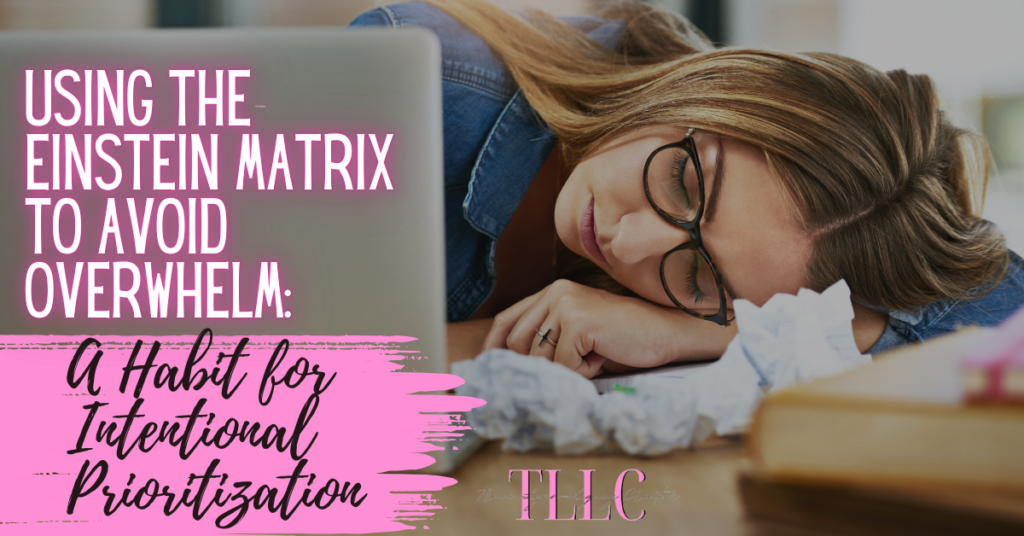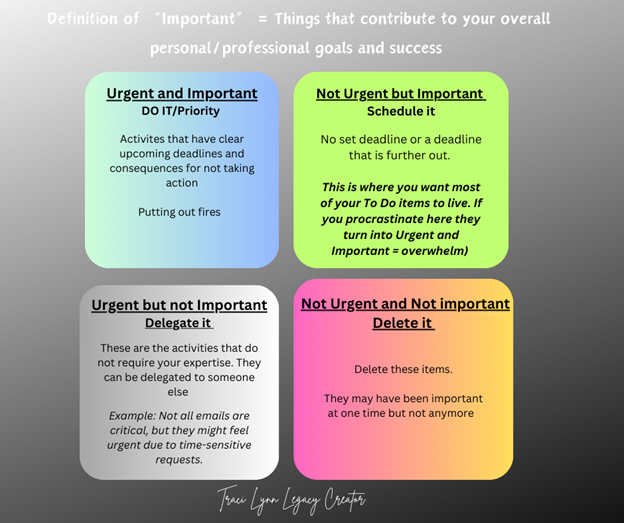We’ve all been there—looking at an ever-growing to-do list and feeling completely overwhelmed. It seems like everything is urgent, everything is important, and there’s just no way to get it all done. But is that really true? Are all tasks created equal, or do we need to change how we approach our list? Enter the Einstein Matrix, a simple yet powerful tool that can help us break free from the chaos and be more intentional about our priorities.

The Einstein Matrix (also known as the Eisenhower Matrix) encourages us to categorize tasks based on urgency and importance. While the concept is simple, it takes practice and intention to make it part of your daily habit. When you do, you’ll find that it clears the clutter from your mind and helps you focus on what truly matters, avoiding unnecessary stress.
Step 1: Write Out Your To-Do List
First, take a deep breath and write down everything you want to do. The act of writing itself is cathartic, giving you a visual representation of what’s demanding your attention. Whether it’s professional responsibilities, personal errands, or household tasks, put it all on paper.
Step 2: Identify What’s Truly Urgent and important.
Not everything on your list requires immediate action. To break free from the mindset that “everything is urgent,” circle the tasks that have looming deadlines. These are the items that, if not addressed soon, could have serious consequences. For example, missing a project deadline for work or failing to pay a bill on time can lead to stress or other complications.
Then focus on the tasks that carry the most weight. These are the things that, if left undone, could have the biggest negative impact on your goals, well-being, or long-term success. For example, while sorting through your email might not feel urgent, skipping a health check-up or neglecting a major work project could have serious long-term consequences.
Step 3: Your Priority List
Now, look at the circled items—these are your main priorities. They are urgent, important, or both, and should be addressed first. Instead of rushing through everything on your list, focus your energy here, knowing that completing these tasks will give you the most relief and progress.
Step 4: Schedule the important but not urgent Items
Once you’ve tackled the priority tasks, look at what’s left. These are important but not urgent, meaning they don’t need to be done today, but they still matter. Instead of letting these tasks add to your daily stress, schedule time to complete them later. Perhaps it’s setting aside time during the week to organize your finances or declutter your home. Just the act of scheduling time in your calendar to address these actions helps to relieve stress.
Step 5: Delegate or Delete
For the remaining tasks on your list, consider whether they need to be done by you. Is there someone who can take over some of these responsibilities? Delegation is a powerful skill that can free up your time and energy for more important matters. If a task doesn’t need to be done at all or adds little value to your life, delete it from your list entirely.

Final Thoughts: Be Intentional with Your To-Do List
It’s easy to fall into the trap of thinking everything is urgent, but that mindset leads to overwhelm and burnout. By using the Einstein Matrix, you can create a habit of prioritizing what’s truly important. Focus on the tasks that move the needle, let go of what’s not urgent, and avoid the stress of trying to do it all at once.
The goal is to keep as many items as possible under Not Urgent but Important because these items are not pressing. They have a deadline that gives you ample time to complete it. When you schedule the time to work on these items – you make progress at a pace that is tolerable and not stressful. When you procrastinate on doing these items they become Urgent and Important which can cause overwhelm and anxiety.
Ultimately, it’s about shifting your perspective and being intentional with your time. The goal isn’t to have an empty to-do list, but rather to feel confident that you’re spending your time on what matters most.